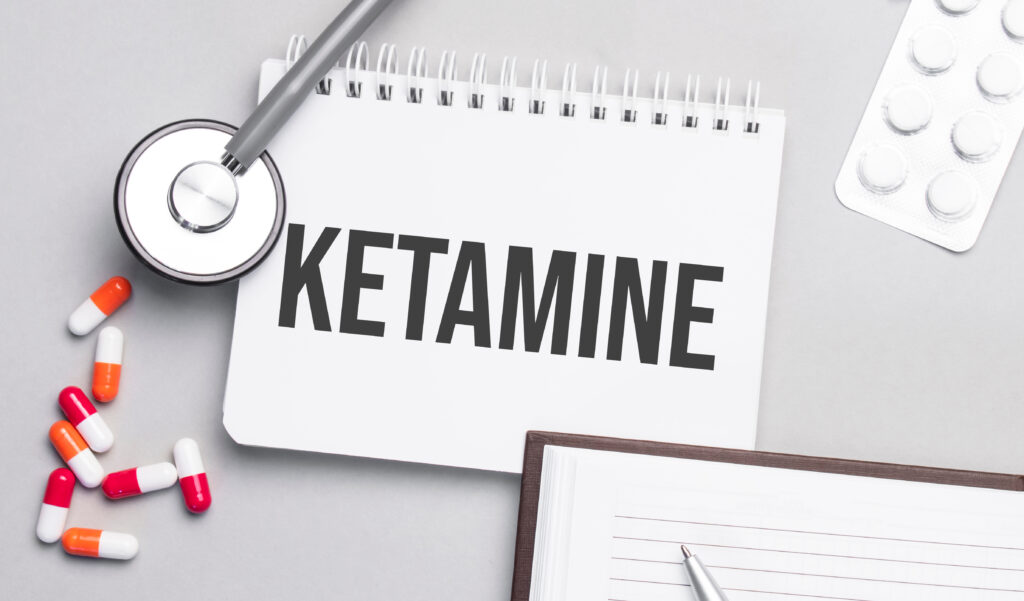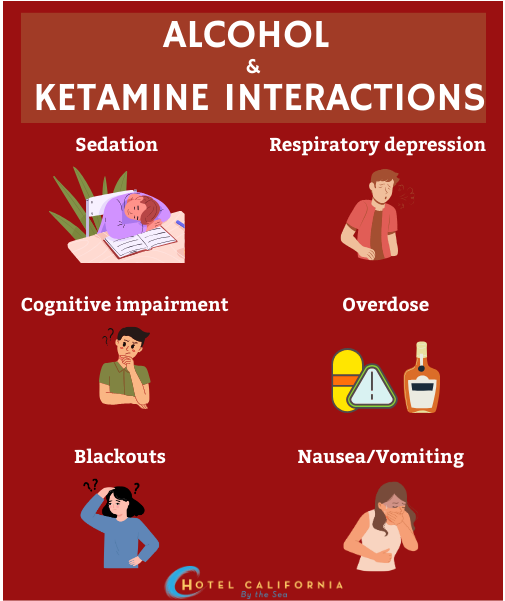Polysubstance Use: Ketamine and Alcohol
Ketamine and alcohol, also known as party drugs, have been a popular polydrug combination since the rise of recreational ketamine in the 1980s. Mixing the two substances, although quite popular among party-goers, can be risky and life-threatening. It can be dangerous even in the smallest of amounts. Both ketamine and alcohol affect the central nervous system and are commonly abused and used recreationally. When taken together, they impact the same chemical receptors in the brain and can exacerbate each other’s negative side effects.

Alcohol is one of the most popularly used substances in the world. It is also one of the only legal substances, making it easily accessible to all. In fact, the excessive consumption of alcohol often leads to the consumption of other mind-altering substances including psychoactive drugs like LSD, MDMA and ketamine. Ketamine is well known to be a club drug and has recently made waves in the clinical field as researchers find ways to use the substance to help treat severe mental health conditions such as treatment-resistant depression and anxiety. The combination of the two drugs can cause risky complications when abused.
Ketamine and Alcohol
Ketamine is a fasting-acting drug that can take effect within minutes after administration. Depending on the dosage, it can produce a very intense sense of euphoria. It causes someone to experience calmness, relaxation, pain relief and sometimes a sense of detachment or dissociation from one’s self. Ketamine use began in the U.S. in the 1970s. Still today, the complexities of the drug are not yet fully understood. There are not enough studies on the drug showing the long-term side effects of its use.
Alcohol on the other hand, has been a substance used for centuries. It has been part of religious and cultural ceremonies in many cultures and is even considered to be socially acceptable in many modern societies today. Despite its worldwide acceptance, alcohol can still be a dangerous drug. According to the World Health Organization (WHO), alcohol abuse contributes to around 200 diseases worldwide and leads to an estimated 3 million deaths per year. Reports published by the WHO also found that young adults ages 20-39 were the main consumers of alcohol. This is on brand for being known as a club drug. When abused, alcohol causes internal damage to many different systems including the brain, heart and liver.

Ketamine and alcohol are a popular drug combination. It was widely popularized in the party scene where users would take both drugs to enhance the sensation of a feel-good high while partying the night away. During recreational use of both ketamine and alcohol, users often develop a tolerance and dependence on the drug leading to more frequent use or a higher use dosage. This can be dangerous and lead to an addiction to either or both drugs.
With long-term use, ketamine has been shown to eventually produce symptoms of depression. With long-term use of alcohol, the substance also produces symptoms of depression and other mental health conditions. Both drugs can produce depressive effects by slowing down hyperactivation of the brain’s excitatory pathway and prolonging the blockage of excitatory receptors that are normally available.
Both ketamine and alcohol are capable of producing significant and unpredictable effects on our brain chemistry. It can change the perception of our normal thought patterns, it can change our mood, it can change our emotions and change our behaviors. The effects of both drugs can lead to severe sedation and enhancement of each other’s effects. Ketamine produces sedative and dissociative effects that can also mimic that of alcohol intoxication. Those who use the drugs recreationally and mix them usually have the goal of experiencing a “k hole.” A “k hole” is an intense high, sedative feeling of complete dissociation from reality and pain.
Check Your Insurance Coverage for FREE
Find out if your insurance covers addiction treatment in minutes. We accept most insurance!
Side Effects of Mixing Ketamine and Alcohol
- Drowsiness – Both drugs produce feelings of sedation and relaxation.
- Hallucinations – Ketamine is a dissociative drug and can lead to the development of hallucinations and psychedelic dissociations.
- Confusion – Mixing both substances can lead to a rapid decline in cognitive abilities including clear communication such as slurring your speech. In some cases, you may also put yourself in high-risk situations due to poor decision-making. The combination of the two drugs can also lead to an exacerbation of current mental health conditions.
- Loss of coordination – It can affect the ability to physically move.
- Difficulty breathing – It can slow down breathing that can result in respiratory depression to the point where you can stop breathing resulting in coma or death.
- Irregular heartbeat – The cardiovascular effects include high blood pressure, palpitations and chest pain. In high doses of ketamine and alcohol, it can even lead to stroke or cardiac arrest.
- Abdominal pain – Ketamine use is often linked to the development of a urinary tract infection and inflammation of the bladder. It is also known as ketamine bladder syndrome. The frequent and urgent feeling of urination can be painful and cause lower abdominal pain.
- Nausea and vomiting
- Seizures
- Cravings – Abuse of both substances can lead to dependence and cravings for both ketamine and alcohol.
- The person may appear more drunk than usual compared to how much they drank. They may have difficulty walking, appear agitated, engage in irrational behavior and can start drooling due to producing increasing amounts of saliva. They may also appear more anxious and paranoid and can drift in and out of consciousness.
Long-term consequences of mixing Ketamine and Alcohol
The long-term effects of ketamine and alcohol polysubstance abuse can result in permanent damage and decline to many organ functions. A person can develop heart conditions, serious bladder issues and can result in impaired memory and cognitive functions. Overloading the body with a depressant substance such as alcohol can also potentially lead to psychiatric and psychological conditions. The person can develop delirium, amnesia and a severe lack of motor control. Ketamine is still a fairly new drug that is still in long-term studies. So prolonged use of the drug can cause unpredictable effects. The combination of both can increase life-threatening effects on the system that researchers have yet to discover.
Reach out to Hotel California by the Sea
We specialize in treating addiction and other co-occurring disorders, such as PTSD. Our Admissions specialists are available to walk you through the best options for treating your addiction.
Treatment for Polysubstance Abuse
Both ketamine and alcohol can become dangerous substances when used in excess. When used together, it can create even more dangerous outcomes. It can significantly impact functions in the body such as digestion, cardiovascular function and the central nervous system. It can also impair cognitive functions such as memory, learning and decision-making. Depending on the dose, it can cause unpredictable effects. Constant use of both drugs most often leads to tolerance, dependence and then addiction. Behavioral health treatment programs such as Hotel California by the Sea assists in treating substance use disorder, alcohol use disorder and polysubstance use disorder.
We have a specialized program to help those who have become addicted to alcohol, ketamine or both. Our treatment begins at any level of care including detox, residential, partial hospitalization program and intensive outpatient program. In addition to medication-assisted treatments and medication management, we also utilize behavioral therapies such as CBT, DBT and EMDR therapy. The combination of different treatment modalities allows us to address every aspect of addiction. Hotel California by the Sea is committed to helping our clients reach their recovery goals and overcome their addictions.
References:
https://www.healthline.com/health/ketamine-and-alcohol
https://pmc.ncbi.nlm.nih.gov/articles/PMC9323326
https://zinniahealth.com/substance-use/ketamine/with-alcohol
https://www.rehab4addiction.co.uk/blog/polysubstance-use-dangers-mixing-ketamine-alcohol
